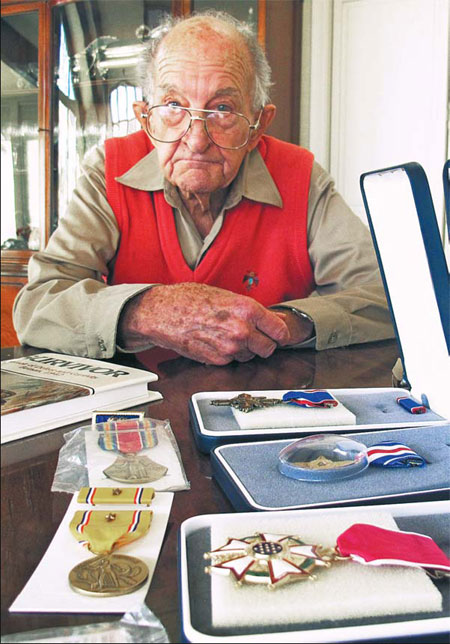World War II veteran gets his medals after 66-year wait
Updated: 2011-11-15 08:01
(China Daily)
|
|||||||||
|
Tom Harrison, 93, displays his World War II medals at his home in Salt Lake City. Harrison spent several years in a Japanese prisoner of war camp after enduring the brutal Bataan Death March. He returned home to his family, and more than six decades later, just received seven medals honoring his service, including the Distinguished Service Cross and the Silver Star. [Brian Skoloff / Associated Press] |
Surprise delivery source of pride for ex-POW Harrison, 93
SALT LAKE CITY, Utah - More than six decades after being freed from a Japanese prisoner of war camp, a Utah veteran was compelled to relive the horrors and triumphs of his World War II experience this month when he received a mysterious package containing seven military medals, including the Distinguished Service Cross and Silver Star.
The medals have become a source of pride for retired Army Captain Tom Harrison, 93, since they arrived in a box with nothing more than a packing slip from a logistics center in Philadelphia on Nov 4, which happened to be his 65th wedding anniversary. But they have also refreshed painful memories of the Bataan Death March, Japanese prisoner of war camps and the comrades he lost during the war or in the years since.
Harrison can talk at length about his time as a soldier in the Philippines. But he talks about it much like he talks about golf, focusing on small details - be it the flight of a well-hit tee shot or the day he met General Douglass MacArthur - and the people that surrounded him. He doesn't dwell on his own valor.
After the bombing of Pearl Harbor forced the United States into the war, Harrison spent months fighting the Japanese before US and Filipino troops surrendered at the Battle of Bataan. He eventually survived, without lasting physical injury, the Bataan Death March and three-plus years as a Japanese prisoner of war.
"It brings back memories, but also makes you feel like somebody appreciated your service," Harrison said while sitting in his living room with the medals. "It also reminds me of the people I served with in the Philippines. I'm the only survivor from my unit now. I've lost most of my friends."
About 20 years ago, Harrison "shook the cobwebs loose" on his war experiences by writing a book called Survivor. That has made it easier - but not easy - to talk about the suffering, the disease and the starvation that defined the years of imprisonment.
The medals prompted new interest from his family about the war, Harrison said, although he is reluctant to talk at length about his personal experiences. Instead, Harrison holds up a Presidential Unit Citation as one medal he was particularly pleased to receive because it recognized the soldiers he served with and trained.
His leadership and bravery earned him two of the army's highest honors, the Distinguished Service Cross and Silver Star. While those medals are only given for extraordinary acts of selfless valor, Harrison said he doesn't remember - or is reluctant to explain - what he did to earn them.
"I don't like to talk about what makes a hero. It's not something I like to broadcast," Harrison said. "But my kids are impressed, and my grandkids say they (the medals) are 'awesome'."
It hasn't been uncommon for World War II veterans to receive medals decades later because relatively few were actually given out during or immediately following the war, said retired 1st Sergeant Dennis Meeks, a customer service manager for the South Carolina-based Medals of America, a company that works with military officials to distribute medals to veterans.
Instead, veterans were given ribbons because precious metals such as bronze and silver were needed for more pressing wartime needs, Meeks said. Additionally, a number of medals were granted in the years after service members were discharged.
That means many veterans needed to apply to receive their medals, and a strong majority of them did not.












